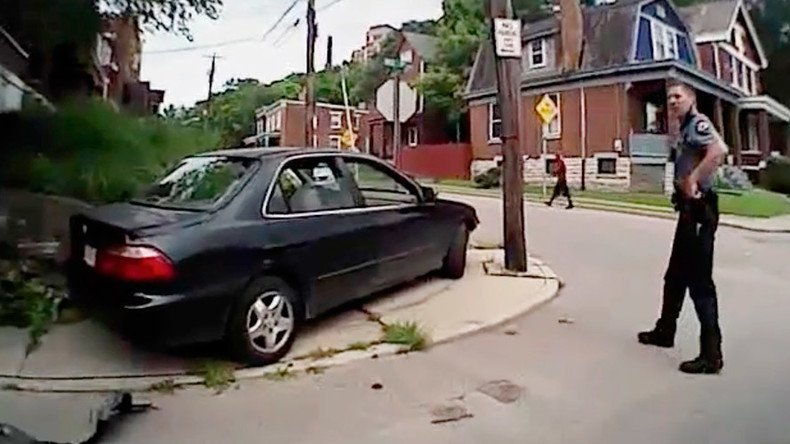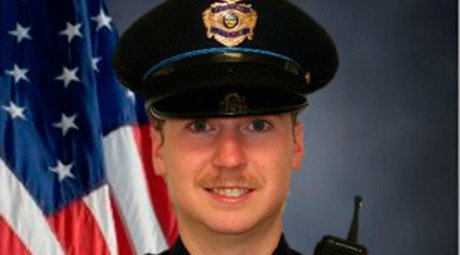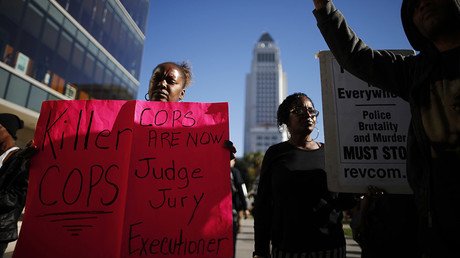Univ. of Cincinnati will pay $4.85m to family of man killed by officer

The University of Cincinnati has agreed to settle with the family of Samuel DuBose, an unarmed black man who was fatally shot by a university police officer in July. The settlement includes $4.85 million and education for DuBose's 12 children.
It took two days of mediation for the university and DuBose's family to reach the agreement, according to the New York Times. The final cost for the school is expected to reach more than $5 million.
On July 19, DuBose, 43, was shot in the head and killed during a routine traffic stop near the University of Cincinnati's campus. University police officer Ray Tensing, 25, has pleaded not guilty after being indicted for murder and involuntary manslaughter.
Unarmed black man shot in head by cop during Cincinnati traffic stop http://t.co/wPnRuxywMGpic.twitter.com/5uBrnKSyiv
— RT America (@RT_America) July 22, 2015Tensing, who is white, pulled over DuBose, who is black, because the officer said that the driver was missing the front license plate on his car. After a brief struggle between the two men, Tensing shot DuBose in the head in what the county prosecutor called a "senseless, asinine shooting."
The settlement does not require the university to admit liability, but does include a promise of free undergraduate education for DuBose's 12 children, a memorial dedicated to DuBose on campus, an apology from the university, and the involvement of his family in discussions of police reform, in addition to the money. University president Santa J. Ono said the school felt a "civic responsibility" to go above and beyond the usual cash settlement commonplace after police shootings.
“I wanted to take care of the family and the next generation of the family,” Ono told NYT. “And I wanted it to be absolutely clear that the University of Cincinnati cares not only about this family, but also about peace within the city of Cincinnati.”
Dayton - John Crawford, Cleveland - Tamir Rice, Cincinnati - Sam Dubose . This state is trash
— Obae Wan Kenobi (@MacchiatobIend) December 28, 2015DuBose's daughter Raegan, 18, is managing her father's estate. She said she was "very comfortable" with the settlement, but told NYT that the process was grueling.
“At times I wanted to walk out because I felt like they were putting a price on my father’s life," she said.
DuBose's sister, Terina DuBose-Allen, said the family is happy to be involved in discussions surrounding reform of the university police system. That provision in the settlement “brings us peace with the fact that they are going to make some reforms.”
“We’re not happy, we’re not satisfied – those aren’t the words,” she told the Cincinnati Enquirer. “The settlement means we’re moving forward and we can heal.”
Cincinnati cop pleads not guilty to murder in Dubose shooting, bail set at $1 million http://t.co/3Hra9Ytmj8pic.twitter.com/NPV7CCOb0L
— RT (@RT_com) July 31, 2015Tensing was fired by the university shortly after the killing and awaits a pretrial hearing on Feb. 11 in Hamilton County Common Pleas Court. In his original account of the encounter with DuBose, Tensing said he feared for his life prior to firing his gun and that he thought he would be run over by DuBose's car.
Yet the shooting was captured on Tensing's body camera. The released video of the incident shows that the car starts moving after the shot. The video evidence indicates that the shooting was "without question a murder," according to Hamilton County prosecutor Joe Deters.
Mark O'Mara, attorney for the DuBose family, said the body camera footage is crucial in the pursuit of justice in this case.
“We all know that if it wasn’t for the body camera, Sam would have been the aggressor,” O’Mara told the Enquirer in reference to the initial account Tensing gave after the shooting.
“Sam would have had his arm in the car as he drove away, and the officer had to shoot him to protect his own life, right? That was the narrative, and the only piece of evidence – thank God – that countered that was the body camera.”
Im blessed to have free tuition n 4.8 million but this still wont replace my daddy. RIP #SamDubosepic.twitter.com/dgTlBawmjN
— Boolie (@booliegold) January 18, 2016DuBose-Allen, Samuel DuBose's sister, said body cameras are a part of police reform, but a camera did not keep her brother alive.
“I do get that they are just one small piece of it,” she said. “I mean, the video camera did not stop my brother from getting shot in the head. The video camera did not stop the lies and the cover-up of what happened. The video camera ultimately served to vindicate Sam, even if the jury ultimately doesn’t find Tensing guilty, we all knew what we knew."
She added: “We hope – not just for the citizens, but for the police officers – that the video cameras vindicate them.”
The settlement amount is in line with those associated with other fatal police shootings of late involving high-profile murders of unarmed black men, including Eric Garner in New York City ($5.9 million settlement) and Freddie Gray in Baltimore ($6.4 million)














